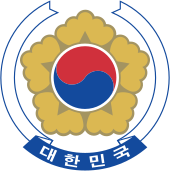South Korean criminal law code
| Penal Code |
|---|
 |
|
| Territorial extent | South Korea |
|---|
| Enacted | Sept 18, 1953 |
|---|
| Commenced | Oct 3, 1953 |
|---|
| Status: In force |
The Penal Code or Criminal Act[1](형법[2]) is the criminal law code in South Korea. The first modern criminal code in Korea was introduced during Japanese rule. From 1912 to 1953, the Japanese Criminal code was used for around 40 years. In September 1953, South Korea enacted its own criminal code.
History
Crime laws for Joseon generally followed China; however it also reflected Joseon and Neo-Confucianist ideologies. In 1912, the Governor-General of Korea declared the Chosun Criminal Order (조선형사령) and on April 4, the Penal Code of Japan and Criminal justice system of Japan came into force in Korea. After liberation, the Chosun Criminal Order remained in place until October 2, 1953.
The law was enacted 50 days after the Korean War ceasefire on September 18, 1953. 15 days later in Oct.3, the law was officially in force.
The Penal Code enacted in 1953 was mostly a translation of the Japanese criminal code. As time passed, South Korea's Penal Code became more subjective than its inspiration. The South Korean Penal Code has stronger penalties than its precursor, excluding robbery and other property crimes. Punishments were stricter on laws regarding government rights and almost all laws include punishments for preparing a criminal act.
Types of punishment
Punishments included capital punishment, Imprisonment with hard labor, Imprisonment, disqualification, loss of rights, fines, minor fines, and confiscation of property.
Imprisonment with hard labor is classified as an Indefinite imprisonment or a definite imprisonment. Definite imprisonments are longer than 1 month and less than 30 years. However, in the case of an additional punishment, dsentences can extend to 50 years.
Parts
The penal code of Korea is composed of two parts, a general regulation and crime-specific. In general regulations have four parts:
Penal Code of Korea
- conspiracy of a rebellion
- conspiracy of the foreign troubles
- crime about the national flag
- crime about diplomatic relations
- infringement of public peace
- crime about explosive materials
- crime about a duty of Public Officials
- interference with a government official in the exercise on his dutyoutl
- a fugitive and a concealment of the criminal
- the perjury and the destruction of evidence
- the calumny (the false charge)
- spoil a dead body and a burial ground
- the incendiarism and an accidental fire
- crime about irrigation and water control
- infringement of the traffic
- crime about drinking water (poisoning into water)
- crime about illegal drugs
- crime about currency (a counterfeit)
- crime about a check, a bond, a stock (forgery)
- forgery of a document (public and private)
- the forgery of a seal
- crime about adultery
